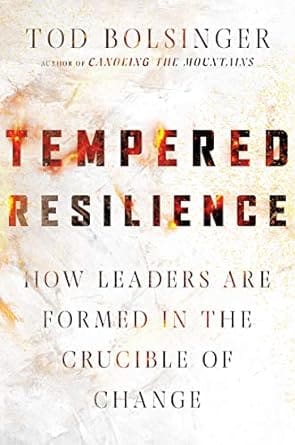
The Challenge of Adaptive Leadership
 Excerpt taken from Chapter One, “The Crises of Leading Change,” of Tempered Resilience by Tod Bolsinger
Excerpt taken from Chapter One, “The Crises of Leading Change,” of Tempered Resilience by Tod Bolsinger
The man across the table from me was a generous and successful businessman. He had already given a considerable donation to the work my team was spearheading at the seminary, and we were asking him for even more resources.
He looked at me and asked, “So if another seminary asks you to share what you are learning, what will you do? What will you say to them?”
“It’s already happened,” I told him. “I have already spoken to a dozen or more schools and seminaries. And when they call, we tell them everything. Everything we have learned. Every mistake we have made. Every pothole to avoid. Everything we haven’t yet tried. We share it all.” We talked about that what he was funding through us was bigger than us. That what we are trying to do in leadership formation is bigger than any one school. Soon we were talking about Elon Musk’s work with Tesla and how he had made the plans for the batteries on his electric vehicles an open-source technology, sharing all of the patents so that other companies could accelerate the vehicles that he believed would help fight climate change.
“The real challenge,” I said, “is not figuring out the new plans but changing the factories that are used to building on the old plans.” I explained that even if we gave every so-called competitor our plans for innovating Christian leadership formation and theological education, they would have to change their own organizational cultures. That is, both the leaders and their organizations need to adapt.
Adaptive leadership, as developed by Ronald Heifetz and Marty Linsky, is an approach to organizational problem-solving that starts with diagnosis: Is this problem something that an expert can solve or not? Is this something that requires us to apply a solution that already exists, or does it fall outside of our current knowledge and expertise and therefore will require learning (and usually result in loss)?
Adaptive challenges are the true tests of leadership. They are challenges that go beyond the technical solutions of resident experts or best practices, or even the organization’s current knowledge. They arise when the world around us has changed but we continue to live on the successes of the past. They are challenges that cannot be solved through compromise or win-win scenarios, or by adding another ministry or staff person to the team. They demand that leaders make hard choices about what to preserve and to let go. They are challenges that require people to learn and to change, that require leaders to experience and navigate profound loss.
As we shall repeatedly see, developing adaptive capacity, that is, the personal and organizational transformation of leaders and their people to apply and adapt their core values in a rapidly changing context, is the greatest challenge of adaptive leadership. Groups are hardwired to believe that survival usually means reinforcing the way things have always been. So when an organization feels stress, the default behavior of most organizational leaders is to solve the problems for our organizations rather than change our organizations for meeting the needs of the world. The result is that instead of undergoing transformation to be more effective in our mission to serve the world, organizations unconsciously reinforce the very status quo that is not working.
So, to restore their flagging attendance or lagging donations, churches keep offering the programs they have always loved and try to fill the facilities that they invested in building. Schools want to attract students to maintain the faculty who have come to research within the safety of tenure and the resources of an academic community. Nonprofit organizations that were once an innovative solution to a real problem become, after a time, organizations whose own survival is now the core purpose for being.
But, when a changing world or changing needs require that the church, school, organization, or institution change to keep being relevant to the real challenge that is arising, it becomes clear that the internal organizational change needed—and the losses that must be faced by our people to become more missionally focused—is an even more difficult leadership challenge than the external reason for changing. And when leaders experience the resistance of their people, failure of nerve or failure of heart begins to take root.
In the Scriptures we see the people of God wrestle with the losses and learning required of them from the very earliest days—and we see Moses struggling to keep the people of God focused on securing the very freedom they have been promised. In Exodus 13, when Pharaoh lets the Israelites go, God leads his people in a roundabout way through the wilderness. Even though they had just been rescued from slavery through God’s multi-faceted and miraculous intervention, God knows they are not ready for freedom. He knows he can’t take them on the most direct route to the Promised Land because it would risk a confrontation with their centuries-old nemesis, the Philistines, and any confrontation may make them “change their minds and return to Egypt.” (Exodus 13:17).
As they camped on the Egyptian side of the Red Sea, the word goes out that Pharaoh is coming for them. In a panic they cry out to God and accuse Moses,
Was it because there were no graves in Egypt that you have taken us away to die in the wilderness? What have you done to us, bringing us out of Egypt? Is this not the very thing we told you in Egypt, “Let us alone and let us serve the Egyptians”? For it would have been better for us to serve the Egyptians than to die in the wilderness. (Exodus 14:11-12).
Moses assures them of God’s presence and power that will protect them, and soon they are standing on the opposite shore of the Red Sea, watching the Egyptian warriors being drowned in the very same spot they had walked across on dry land. They see firsthand God’s power again, and Exodus 14 ends with, “So the people feared the Lord and believed in the Lord and in his servant Moses.”
After ten plagues and salvation at the Red Sea, the Israelites are full of faith and courage; eager to press on to the Promised Land. They gather in joyful celebration, and Moses leads them in a song of praise of God’s power and trust in God’s steadfast love. Moses’ sister, Miriam, leads them in another song and they set out from the Red Sea. They experience yet another miracle as God turns bitter, undrinkable water “sweet” (no small feat in a desert) and demonstrates again God’s care for the people as they drink their fill.
We would think that having personally experienced such a display of power and love that they had written new worship songs to declare it, they would be more resilient when the rough times come. But in the very first challenge, their faith and courage fold like a deck chair.
In Exodus 16, only six weeks after the miracle of the Red Sea, we read, “The whole congregation of the Israelites complained against Moses and Aaron” (v. 2). Protestations soon became a wish to return to slavery in Egypt rather than risk hunger in the wilderness.
Six weeks. One chapter of the book of Exodus. That’s how long it took for the experience of loss and anxiety to completely crumble the convictions of the people of God on a journey to salvation. That’s how long it took for the people to turn on their leaders. That’s how long it took for sabotage to take hold.
For Edwin Friedman, who was both a family systems expert and a rabbi, this is the critical moment in every leadership challenge. This is the test that must be passed to truly bring transformation and change: to have the resilience to resist one’s own failure of nerve and overcome the anxiety-fueled sabotage that comes when leaders take new initiatives. “The system . . . must produce leaders who can both take the first step and maintain the stamina to follow through in the face of predictable resistance and sabotage.”
And, if my conversations with Christian leaders all over the country are indicative, this may be the single greatest leadership weakness in the church today. While many healthy churches are giving faithful witness to Christ across the globe, most leaders have not been trained for the challenge of trying to bring change to churches that need transformation in order to be faithful to their missional calling. And this is true for educational leaders, nonprofit leaders, or any other organization that have stakeholders who were trained for a bygone era. In the now-famous words of Ronald Heifetz and Marty Linsky:
People do not resist change, per se. People resist loss. You appear dangerous to people when you question their values, beliefs, or habits of a lifetime. You place yourself on the line when you tell people what they need to hear rather than what they want to hear. Although you may see with clarity and passion a promising future of progress and gain, people will see with equal passion the losses you are asking them to sustain.
When a leader raises awareness of the need for change, the natural result is for stakeholders to resist that change and the loss of that change. That resistance soon turns to sabotage.
…
Adapted from Tempered Resilience by Tod Bolsinger. Copyright (c) 2020 by Tod Bolsinger. Published by InterVarsity Press, Downers Grove, IL. www.ivpress.com
Order your copy of Tempered Resilience: How Leaders Are Formed in the Crucible of Change
Trending Now
Sign up today for your Inspiration Today Daily Newsletter
Supercharge your faith and ignite your spirit. Find hope in God’s word. Receive your Inspiration Today newsletter now!
Tod Bolsinger
Tod Bolsinger is a speaker, executive coach, former pastor, and author who serves as vice president and chief of leadership formation and associate professor of leadership formation at Fuller Theological Seminary. His books include the forthcoming title, Tempered Resilience, the Outreach Magazine Resource of the Year in Pastoral Leadership, Canoeing the Mountains, and the Christianity Today Award of Merit recipient, It Takes a Church to Raise a Christian. Learn more at bolsinger.blogs.com
Related Articles
January 29, 2026
5 Traits of Good Leadership
The traits of good leadership aren’t just about results—they’re about relationships. Servant…
December 9, 2025
End-of-Year Giving Benefits: Tax Savings, Legacy Gifts & Stewardship
As the year draws to a close, many believers take time to reflect on God’s goodness, their personal…
November 29, 2025
What Does the Bible Say About Finances?
Learn what the Bible teaches about money, giving, and contentment. Explore 10 scriptural principles…
November 20, 2025
Can You Smile at Your Future?
When you make the Lord your dwelling place amid life’s storms, you can rest confidently in His…
Next Steps To Strengthen Your Walk
Inspiration Today Newsletter
Supercharge your faith and ignite your spirit. Find hope in God’s word. Receive your Inspiration Today newsletter now!
Christian Articles
Find articles to strengthen your walk and grow your faith. We have a wide range of topics and authors for you.
Submit A Prayer Request
We are here for you. Simply click on the button below to reach us by form, email or phone. Together we will lift our hearts and voices with you in prayer.





